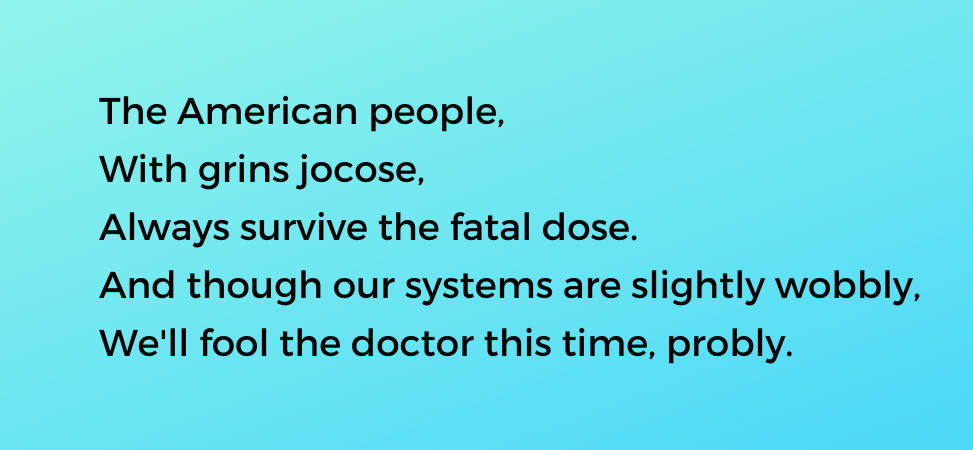On Friday, May 5, I gave a talk to the Ojai Rotary, and the prepared text is below. A slightly different version, the talk as actually delivered (including some lively Q and A), is available on audio here. The talk recounted a number of highlights of my personal and professional history that readers might find of interest.
* * * *
The Rotary Talk
Last week, Marty Pops asked me if I had figured out what I was going to say today, and I said that I had, in a general sort of way, and that my remarks would be more anecdotal than analytical. When I last had the privilege of speaking to this group, I talked about Ogden Nash, about whom I had written an authorized biography. I will not repeat myself, but I hope you will forgive me if one or two Nash quotations creep in.
Perhaps some of you can recall a specific time or event that had a decisive effect on the rest of your lives. In my case it is easy. In December, 1956 I had come down to New York City from Cornell, where I was in my second year of law school. The purpose of the trip was to call on several law firms seeking to be hired as a summer associate. I had no appointments, but the way it was done in those days was to appear unannounced, present a resume and if the resume was pretty good, proceed to an interview.
Well, on a blustery December day, I ran into a classmate, at the corner of Broad and Wall streets and we hurriedly exchanged notes. My friend mentioned one particular firm and I followed his suggestion. That chance meeting and his suggestion would shape the rest of my life, both personally and professionally. That firm was Mudge Stern Baldwin & Todd which would later become Nixon Mudge and, still later, Mudge Rose.
From a personal standpoint, it was an associate from the Mudge firm who, a few years later, arranged the blind date with a charming young woman who not only would become my wife, but is still putting up with me. For advice on how to achieve such a record, I can invoke Nash:
Like all advice that is easier to give than follow, and I would not care to be graded on how consistently I have obeyed its precepts, but it is worth keeping in mind.
Professionally, the Mudge firm was my professional home for most of my career and it also led me to some interesting experiences serving in the government. As an associate, I worked closely with the head of the litigation department, Len Garment. And when Richard Nixon joined the firm, Garment persuaded Nixon to argue in the Supreme Court a case against Life magazine that Len had won in the New York courts. One day when we were working on the case, Nixon remarked that Justice Fortas would vote against him because Fortas was a partisan Democrat.
As it happened, we lost the case in the Supreme Court but Fortas voted for us and his dissent was highly critical of Life magazine. Years later, I met Fortas, after he had been forced to resign from the Court, and I mentioned the case. Fortas responded that he would always remember the case and that Life had remembered it as well. He was alluding to the fact that Life had broken the story of Fortas’s relationship with a financier, Louis Wolfson, that led to Fortas’s resignation. That relationship, I might mention, was rather more modest than the relationship between Justice Thomas and Harlan Crow that is a matter of considerable current controversy.
After the 1968 election, I left the Mudge firm and joined the practice of a well-known lawyer in Washington. But in 1973, I was reunited with Len Garment, in the early days of the Watergate investigations, when he became counsel to the President. One of my earliest responsibilities came on the night that President Nixon spoke to the nation announcing the firing of John Dean and the resignations of Attorney General Kleindienst and of Nixon’s aides Bob Haldeman and John Ehrlichman. Garment and I had noticed press photos of Haldeman and Ehrlichman with bulging briefcases and decided we needed to do something to secure critical documents. Garment arranged for the FBI to assume that responsibility and I had the task of seeing that they were deployed in the various locations where files were kept. As it happened, the FBI arrived during Nixon’s speech but were initially denied entry because they carried guns. In a somewhat surreal scene, this issue was debated as Nixon was speaking from a nearby television set. Eventually, we worked out a compromise that the FBI would be allowed in with their guns, but only after the President had finished the speech and retired to the residence. But the next morning, when Nixon discovered a burly fellow guarding the files a few steps down from the oval office, he was (to put it mildly) not pleased.
Other vignettes from that period:
- My picture on the front page of the New York Times alongside Archie Cox and Judge Sirica. They looked jut-jawed and determined, I was captured leaving the courthouse in an ill-fitting suit looking like someone who had just been indicted on several counts of something.
- Appearing with Len Garment in a courtroom sketch during the tapes hearings before Judge Sirica as broadcaster Fred Graham observed, “Meanwhile, the President’s lawyers say glumly by.” Well, we had a fair amount to be glum about.
At the end of November, I concluded that I could serve the cause no longer and fled to the calmer waters of the Department of Housing and Urban Development. We were in the midst of an energy crisis, and I initially served as the Secretary’s assistant for energy affairs. In that capacity, I quickly found myself at the annual convention of home builders and sharing a panel on energy with the Energy Czar, William Simon, and the president of Exxon USA. I could not tell you what any of us said, but my general recollection is that I made as much sense as they did. I continued to work on energy matters for several months and then became Deputy General Counsel.
While I was at HUD, I found that I had not put Watergate completely behind me when I was called to testify before a Grand Jury. For those who have not had the experience, I will simply say that it does tend to concentrate the mind.
At the end of the Ford administration, I returned to the Mudge firm in New York where I had the opportunity to handle a number of interesting cases. One of them involved by representing the Toronto Blue Jays in which we successfully defeated the attempt of the Boston Celtics to get Danny Ainge to breach his contract with the Jays and come play basketball. I could spend my whole 20 minutes telling you about that case, but I will simply say, we won and it was great fun. In the end, the Celtics bought out Ainge’s contract and he went on to have a successful career in basketball. The president of the Blue Jays at the time, Peter Bavasi, remains a good friend to this day.
On the subject of baseball, I will mention that I was born in Chicago and, although I grew up, and would spend most of my life on the East Coast, we were living in Chicago in 1945. The Cubs won the pennant that year and I became a lifelong Cubs fan. I am probably one of the few living Americans to attend a World Series game at Wrigley Field in two separate series: 1945 and 2016. The Cubs lost both games, but no matter.
Some other interesting cases I handled after my return to the Mudge firm included
- a business interruption claim after a major industrial fire. (I also worked with Len Garment in getting a dismissal of criminal charges against the company.)
- a claim against NASA involving the TDRSS satellite (and its fourth order linear predictive doppler loop filter)
- defending a claim against the general contractor who built the airport in Riyadh, Saudi Arabia
My biggest disappointment came in representing St. Bartholomew’s Church in asserting its constitutional right to build on a portion of its property. We lost in the trial court and in the Second Circuit, and the Supreme Court denied our petition for certiorari. Despite that failure, I became a lifelong friend of the church’s Rector, Tom Bowers with whom I am still in frequent contact.
I retired from the practice of law in 1995 and we moved to Cape Cod. A major activity on the Cape was writing the biography of Ogden Nash, whose verse I had always enjoyed. Research for the book took me to libraries in Boston and New York and to the University of Texas, where Nash had sold his papers.
When I was doing research at the New York Public library, I took a break and went across Fifth Avenue to a coffee shop. Sitting at the counter, I found myself chatting with an off-duty policeman. To explain my project and Ogden Nash, I quoted what may be Nash’s best known verse, “Reflections on Ice Breaking”:
“Oh,” the cop responded, “I know a hooker who has her own version: Candy is dandy, but sex doesn’t rot your teeth.” Sometime later, I told the story to my dental hygienist who indicated that she was also familiar with the latter version. Ah, the universality of Nash….
In 2013, I began writing a blog of political commentary, RINOcracy.com. The title is derived from the derogatory term, RINO, used by some to refer to a “Republican In Name Only” or someone they believe is not conservative enough to be a Republican. I decided to convert the term from a slur to a badge of honor. In 2020, I decided that I could no longer justify even that tenuous connection with the Republican Party and decided to abandon my lifelong association with the Republican Party and changed my registration to Democrat.
Arguably, I should have changed the title of the blog at that point, but I had grown fond of the title and saw no reason to confuse my small following.
If you are not familiar with RINOcracy.com, if you are a centrist in either party, it may appeal to you; if you are not, it probably won’t. If you are a committed supporter of Donald Trump, you will probably wish to look elsewhere. Apart from Trump, the blog reflects my own tendency to be a fiscal conservative and social liberal. Beyond that, the blog aspires to be a small island of rational thought in the sea of partisan noise that surrounds us. My own biases frequently lead me to regard Republicans as scurrilous and Democrats as inept.
I will not burden you with specific arguments or analysis from the blog except to say that in general, I view our current situation as exceptionally dangerous, in terms of the approaching debt ceiling, and depressing in terms of our epidemics of gun violence, substance abuse and political alienation.
Nevertheless, to end on a positive note, I will turn again to Ogden Nash who wrote, in 1933:



